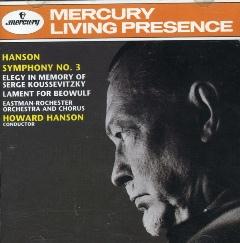Hanson – Symphony No. 3 - Elegy In Memory Of Serge Koussevitzky - Lament For Beowulf (1991)
Hanson – Symphony No. 3 - Elegy In Memory Of Serge Koussevitzky - Lament For Beowulf (1991)

1 1. Andante Lamentando 9:59 2 2. Andante Tranquillo 7:52 3 3. Tempo Scherzando 5:45 4 4. Largamente E Pesante 9:36 - 5 Elegy In Memory Of My Friend Serge Koussevitsky Op. 44 11:21 6 The Lament For Beowulf 17:38 Eastman School Of Music Chorus (tracks: 6) Eastman-Rochester Orchestra Howard Hanson – conductor
When I first started collecting classical CDs, I only had a few Mercury Living Presence (MLP) titles. In my quest to get the absolute best, or at least a definitive recording, of the major works of the standard repertoire, MLP discs rarely topped the critics' lists. In fact, only three MLP recordings have been earmarked as "Essential Recordings" by Amazon.com -- Tchaikovsky's 1812 Overture, Byron Janis performing Rachmaninov's 2nd & 3rd Piano Concertos, and Yehudi Menuhin performing Bartok's 2nd Violin Concerto, all three with Antal Dorati as conductor. It is also safe to say that three other titles are equally essential for their historical value alone. They are Tchaikovsky's Swan Lake by Dorati (the first recording of the complete ballet), Janis performing Liszt's Piano Concertos (the first recordings made in the Soviet Union by American technicians, musical staff and equipment), and Kubelik's Chicago Symphony performance of Pictures at an Exhibition (one of, if not the single best mono recording ever, and the one that led the New York Times critic to coin the phrase "Living Presence," from which the label named its series). But how does a CD line go from having a half-dozen must have recordings, to being this reviewer's all-time favorite classical label?
The answer: consistently magical performances, captured in brilliant golden-age stereo sound, that offer a slightly different take on your typical interpretation of the great works. Of course, MLP also went to great lengths to feature music by more obscure composers, particularly contemporary Americans. While Dorati, and to a lesser extent Paray, recorded these lesser known works, Howard Hanson was their champion. Hanson was also quite the composer himself and there are three MLP discs that demonstrate this, including this disc of his magical Symphony No. 3, Elegy (for Koussevitzsky), and Lament for Beowulf. Maybe that is why collectors prize these recordings, because they are a breath of fresh air in a homogenized world of listening. Of course, collectors love a challenge too, and MLP CDs are becoming increasingly hard to find. It has taken years for me to finally find all of the MLP CDs released to date, and unfortunately I don't think there will be any new releases forthcoming. So collectors, and even those who aspire to be, should pick up as many Mercury Living Presence discs as possible now, before they all die. --- Michael Brad Richman, amazon.com
The Third Symphony’s ruminative expectation is crowned by starkly crushing brass statements seemingly descriptive of some Nordic tempest. The trudging and rushing forward momentum (5:40) is explosive and propulsive. Hanson superbly sustains, accents and goads the progress of the music. He also insists on some mice dynamic contrasts. Sibelius 2 can be heard in those dynamic pizzicato ‘rushes’ from the violins. In the second movement softly chanting woodwind gently launches one of those long string melodies related to that in the Second Symphony. In the third movement there are echoes of Sibelius 3 in the chipper writing for woodwind. This mixed with shadows of Sibelius 1 and the folk ‘stomp’ we hear in Peterson-Berger and later in the symphonies of Hilding Rosenberg. The finale is strident, gripping, raw, dark and sinuously Nordic.
The Koussevitsky Elegy is the most sincere and indomitably built of all the works included here. He owed much to Koussevitsky including the commission for both the second symphony and the piano concerto. Koussevitsky also recorded the Third Symphony on 78s and this has been reissued on Dutton in their Essential Archive series CDEA5021.
The Lament for Beowulf dates from Hanson’s days in Rome and his studies with Respighi. It is amongst his most potently brooding works. It carries all his irresistible fingerprints: long-spun themes, gruff brass punctuation, Holstian insistence from the drums, taciturn majesty and string ostinati with brass punch-syncopated above. At 13:19 there is a delirious counterpoint rising to majesty and at 1630 a Neptune-like evocation of eternity fades into mystery. -- Rob Barnett, musicweb-international.com
download (mp3 @320 kbs):
yandex 4shared mega mediafire zalivalka cloudmailru oboom uplea
Zmieniony (Czwartek, 22 Październik 2015 16:11)








